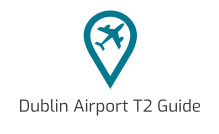Security regulations have tightened up considerably over the past decade, with Ireland following EU-sanctioned guidelines. Luckily, Terminal 2’s advanced infrastructure translates into some of the most up-to-date and efficient security systems operating on the international airport stage.
All the same, queues can be long during peak travel periods, so it’s worth checking the airport website for the latest security news. Knowing which items are prohibited or restricted from flights to and from the airport will get you through security as fast as possible.
The basic list of prohibited items is straightforward, and there’s little on it that the average traveller needs to be concerned about. The strictest controls govern what can be carried into the passenger cabin, with slightly looser regulations for the cargo hold.
The following items may not be carried into the passenger cabin: |
|
| Anything that fires a projectile – be it a firearm, a catapult or a bow and arrow | |
| Toys or replicas that look anything like a real firearm | |
| Any type of stunning device | |
| Clubs and bats | |
| Workman’s tools | |
| Knives or anything else with a sharp point | |
The list of prohibited items for the cargo hold is more obvious: |
|
| Ammunition (preapproved firearms can sometimes be checked) | |
| Anything explosive – from blasting caps to grenades | |
| Fuses, detonators and other incendiaries | |
| Smoke-generating devices | |
On top of this, passengers are sometimes confused by the complex restrictions on liquids, gels and pastes. The restrictions were issued with passenger safety in mind, but they can present serious inconvenience for the unprepared. Basically, any gel, liquid or paste is best checked in the cargo hold. Liquids may be carried into the cabin if they are kept in bottles no bigger than 100 millilitres, and all of these must be stowed in a re-sealable plastic bag no bigger than one litre.
